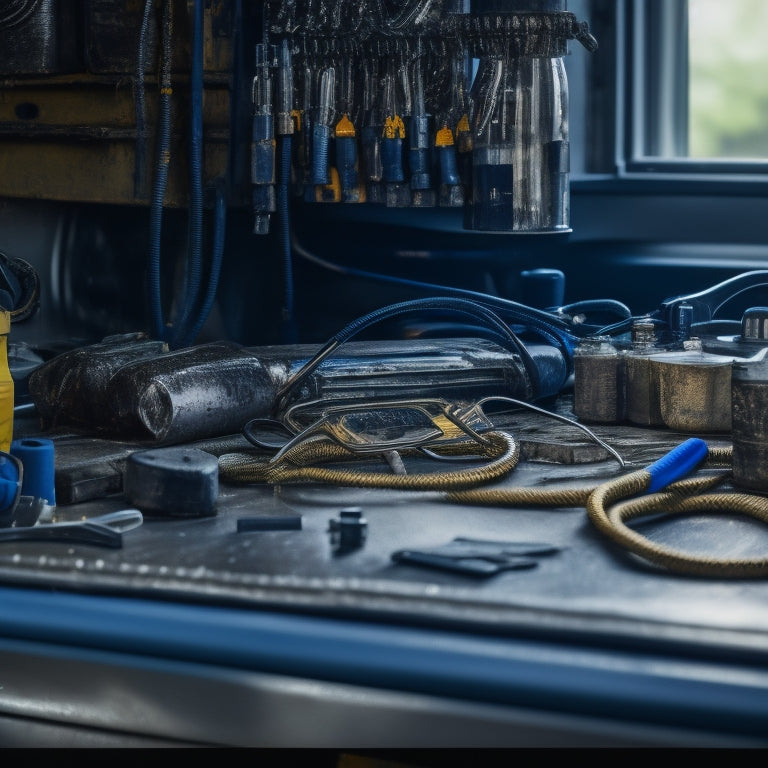
5 Essential Vehicle Panel Maintenance Tips Online
Share
You count on your vehicle panels to perform at their best, but neglecting regular maintenance can lead to a staggering 20% decrease in efficiency, resulting in reduced energy output and shortened lifespan. Inspect your panels regularly to prevent debris buildup, which compromises performance and longevity. Clean your solar panels regularly to guarantee maximum energy harvesting. Check for loose connections daily to prevent power losses, and monitor energy output closely to identify potential issues early. Finally, schedule professional maintenance to make sure your electrical system operates at its peak. By following these essential tips, you'll be well on your way to maximizing your vehicle's performance - and there's more to explore.
Key Takeaways
• Inspect solar panels regularly to identify debris buildup, ensuring optimal energy harvesting and preventing damage.
• Clean solar panels online with a soft cloth, mild soap, and distilled water to maintain peak performance and longevity.
• Check for loose connections daily to prevent power losses, scrutinizing every wire, terminal, and bolt for wear or damage.
• Monitor energy output closely online using real-time tools to identify potential issues early and optimize energy usage.
• Schedule professional maintenance regularly to prevent electrical failures, identifying potential issues early and ensuring optimal performance.
Inspect Panels for Debris Buildup
Check your vehicle's panels regularly to make sure debris buildup isn't compromising their performance and longevity. Dust accumulation on your vehicle's panels can greatly reduce their efficiency, and if left unchecked, can lead to serious damage.
When debris like dirt, leaves, or twigs accumulate on your panels, they can obstruct airflow, causing your vehicle's systems to work harder, which can lead to overheating and premature wear.
Regular inspections will help you identify any issues before they become major problems. Pay particular attention to areas prone to debris buildup, such as the panel edges and corners.
Make sure you clean your panels regularly to maintain their weather resistance. A clean panel surface is essential for top performance and longevity. Remember, a well-maintained panel is more resistant to the elements and better equipped to withstand harsh weather conditions.
Clean Solar Panels Regularly Online
When it comes to maintaining your vehicle's solar panels, regular cleaning is essential to guarantee maximum energy harvesting, and online resources can provide valuable guidance on how to do it effectively.
A clean solar panel is vital to secure optimal energy production, and a dirty one can reduce efficiency ratings by up to 20%. By cleaning your solar panels regularly, you can reap the environmental benefits of using renewable energy while also prolonging the lifespan of your vehicle's solar panels.
To clean your solar panels effectively, follow these steps:
-
Inspect for debris: Before cleaning, inspect your solar panels for any loose debris or dirt that can scratch the surface.
-
Use a soft cloth and mild soap: Gently wipe the solar panels with a soft cloth and mild soap to remove dirt and grime.
-
Rinse with distilled water: Rinse the soap off with distilled water to prevent mineral deposits from forming.
Check for Loose Connections Daily
Daily inspections of your vehicle's electrical connections can help guarantee power losses and maintain peak energy flow. By incorporating this habit into your daily routines, you'll be able to identify and address any issues before they escalate into major problems.
As you perform your daily electrical checks, make it a point to scrutinize every connection, wire, and terminal. Look for signs of wear, corrosion, or damage that could compromise the electrical system's integrity.
When checking for loose connections, pay attention to any wires or cables that appear frayed, cracked, or exposed. Tighten any loose bolts or screws, and make sure that all connectors are securely fastened.
Don't overlook the smallest details, as even a minor issue can have a significant impact on your vehicle's overall performance.
Monitor Energy Output Closely Online
You can monitor your vehicle's energy output in real-time using online tools that provide instant data on your electrical system's performance. This allows you to identify potential issues before they become major problems.
With energy tracking and performance analytics, you can optimize your vehicle's energy output for maximum efficiency and safety.
Here are three key benefits of monitoring your vehicle's energy output online:
-
Early warning system: Identify potential electrical system failures before they leave you stranded.
-
Optimize energy usage: Maximize your vehicle's energy efficiency to reduce fuel consumption and lower emissions.
-
Data-driven insights: Gain a deeper understanding of your vehicle's performance to make informed maintenance decisions.
Schedule Professional Maintenance
Scheduling regular professional maintenance is vital to ensuring your vehicle's electrical system operates within ideal parameters. This helps prevent electrical failures, which can lead to accidents or stranded vehicles. By having a professional inspect your vehicle, you can identify potential issues before they become major problems.
To guarantee your vehicle is in top condition, it's essential to schedule regular maintenance checks. Here's a recommended maintenance schedule:
| Mileage Interval | Recommended Maintenance |
|---|---|
| 15,000 miles | Replace spark plugs, check engine air filter |
| 30,000 miles | Inspect belts and hoses, replace engine oil |
| 60,000 miles | Replace brake pads, rotate tires |
Frequently Asked Questions
How Often Should I Inspect My Vehicle's Electrical System?
You should inspect your vehicle's electrical system every 3-6 months, performing regular dashboard checks to verify all lights and gauges are functioning properly, and monitoring battery life to prevent unexpected failures.
Can I Use Household Cleaners on My Solar Panels?
"Back in the Middle Ages, knights protected their armor with care; similarly, you should handle your solar panels with caution. Don't use household cleaners, which can damage the panels; instead, opt for distilled water and a soft cloth for safe and effective solar panel cleaning."
What Tools Do I Need to Check for Loose Connections?
To check for loose connections, you'll need a multimeter for voltage and resistance analysis, along with wiring diagrams to identify connections, ensuring a safe and accurate assessment of your vehicle's electrical system.
How Do I Know if My Energy Output Is Within the Normal Range?
You'll know your energy output is within the normal range by monitoring your vehicle's power consumption, using a multimeter or energy efficiency analyzer, to guarantee efficient power monitoring and prevent electrical system overload.
Are There Any Maintenance Tasks I Should Perform Before Winter?
Before winter, you should winterize your batteries by checking electrolyte levels and charging them fully, and perform fluid checks on your coolant, brake fluid, and transmission fluid to make sure they're at the recommended levels.
Related Posts
-

What Does Your Home Energy Audit Report Reveal?
Your home energy audit report reveals a detailed analysis of your energy consumption patterns, highlighting areas of ...
-

How to Upgrade Your Home With Geothermal Innovations
You're now on the cusp of utilizing the Earth's natural thermal energy to revolutionize your home's heating and cooli...
-

10 Eco-Friendly Air Management Tools for Clean Home Living
You're taking an essential step towards creating a healthier living space by seeking eco-friendly air management tool...


